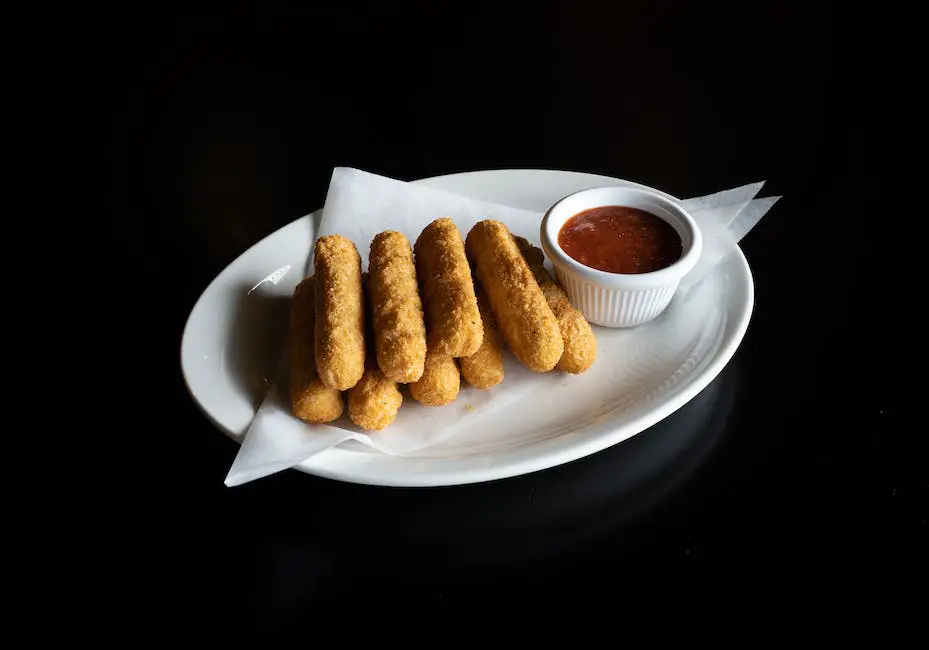It’s near impossible not to savor the crispy, cheesy delight that is an Arby’s Mozzarella Stick. Yet it’s also essential for any health-conscious individual or family to understand the nutritional implications of indulging in such delicacies. Let’s embark on an educational journey on how much calories, fat, carbohydrates, and sodium make up this beloved snack. Moreover, this piece aims to shed light on how to enjoy these treats, while maintaining a balanced diet and suggesting healthier alternatives to contemplate. Remember, the key to a healthy life doesn’t mean giving up on indulgences – it’s about understanding what you consume and managing it wisely.
Understanding the Nutritional Value of Arby’s Mozzarella Sticks
Sink Your Teeth into the Nutritional Details of Arby’s Mozzarella Sticks!
Ever wondered what’s really in your favorite snack from the fast-food drive-thru? We all know that Arby’s mozzarella sticks are incredibly crave-worthy. Those golden nuggets of melted cheese are a delight for the senses. But, have you ever paused to consider the nutritional details of this mouth-watering treat? You might be surprised!
First off, let’s delve into the serving size. At Arby’s, the mozzarella sticks come in two different options: 4-stick and 6-stick. Let’s analyze the nutritional breakdown of the more commonly ordered 4-stick serving.
Every 4-piece serving of Arby’s mozzarella sticks contains a considerable 440 calories. To put that into perspective, the average recommended daily calorie intake ranges from 1,500 to 2,000 calories. Yes! That means these cheesy beauties can take up a significant chunk of your daily intake.
Now, if you’re watching your fats, you might want to pay attention. That 4-piece has 23g of total fat, out of which 7g are saturated fats. Sadly, trans fats that we try to steer clear from are also present, albeit in a minimal amount of 0.5g. Following the heart-healthy diet guidelines, adults should limit their saturated fat intake to around 13g per day, making Arby’s mozzarella sticks a little over half of the recommended limit.
Do you count carbs? Four sticks serve up a total of 34g of carbohydrates. On a typical 2,000 calorie diet, the recommended daily carbohydrate intake falls betwixt 225 and 335 grams.
Considering sodium, these sticks contain 1060mg. That’s almost half of the American Heart Association’s recommended limit of 2,300mg per day. Anyone monitoring their sodium intake for blood pressure and heart health should be mindful.
Moreover, there’s 16g of delectable protein in every 4-piece helping. Not forget to mention, you’ll also receive 10% of your RDA of bone-healthy calcium! For growing kids and those looking to up their protein, this can be a minor win.
But let’s not overlook the sugar content. With 3g of sugar, it’s not an over-the-top sweet treat, as one may assume. This sugar mostly comes from the breading and the seasoning used.
So now you know! While Arby’s mozzarella sticks certainly won’t qualify as a health food, they can certainly be categorized as comfort food. As with any treat, moderation is key. Make informed choices, balance out with healthier options, and at the end of the day, don’t forget to savor every bite! After all, the pleasure of dining is not just about the food, it’s about the joy it brings. So, enjoy your food, and remember, it’s all about balance!
And here’s to making mealtimes something to look forward to!

Finding Balance: Balancing Calories from Arby’s Mozzarella Sticks in a Healthy Family Diet
Balancing the Calories from Arby’s Mozzarella Sticks in a Family’s Meal Plan
When it comes to making informed food decisions for the family, understanding a meal’s nutritional profile is key. Delectable appetizers like Arby’s Mozzarella Sticks, for instance, have become quite a favorite for many. It’s the perfect quick stop meal for kids after school or as a weekend treat. However, it’s essential to fit this into a balanced family diet to maintain overall healthy eating habits.
To balance the caloric intake from this indulgence, consider the portion size first. Since a 4-stick serving amounts to 440 calories, it’s crucial to adjust the rest of your family’s meals for the day accordingly. With their 23 grams of total fat, plan meals with lesser fat content or opt for heart-healthy fats like avocados or olive oil to strike a balance.
Arby’s Mozzarella Sticks carry 34 grams of carbohydrates, playing a vital role in keeping the family energized. To balance out, opt for low-carb meals or snacks for the rest of the day. Incorporating protein-rich foods that complement the 16 grams of protein found in this delight would also be beneficial.
Such salty treats, containing 1060mg of sodium, can easily lead to exceeding daily recommended sodium limits, particularly for children. To counter this, go light on sodium in other meals or snacks. Use aromatic herbs, spices, or lemon juice to enrich the taste without the salt.
Although these sticks do provide 10% of the Recommended Daily Allowance (RDA) of calcium, ensuring that the family gets enough calcium from other healthier sources like leafy greens, fortified cereals, or dairy products can encourage stronger bones and teeth.
Despite having added sugars, they still have a relatively modest sugar content of 3 grams. When balancing out the day’s sugar intake, don’t forget to factor this in. Choosing fresh fruits over sugary desserts or drinks could be a smart choice.
One last note to consider, mindful eating is just as crucial as what is being eaten. Teaching the little ones about the importance of moderation and balanced choices sets them up for a lifetime of healthy eating practices. Remember, the occasional Arby’s Mozzarella Sticks can definitely have a place in a wholesome, balanced diet— it’s all about smart adjustments and choices.
To conclude, it’s perfectly fine to embrace the convenience and taste of on-the-go meals like Arby’s Mozzarella Sticks. What’s essential is to ensure that this is balanced out with nutrient-dense foods throughout the day. Happy and healthy dining!

Healthy Alternatives: Comparing Arby’s Mozzarella Sticks with Healthier Options
For those of us indulging in the crispy, melty goodness of Arby’s Mozzarella Sticks, it may be time to ponder over healthier alternatives at home. We all understand that sometimes life calls for a comforting cheesy bite, but balancing these occasional treats with more nutritious staples is the key to fostering a healthier family lifestyle.
Strolling down the grocery store aisles, one could easily be overwhelmed by the myriad of alternatives available. So here are some healthier choices you could consider the next time you get that cheese stick craving.
For starters, instead of traditional mozzarella sticks, why not give cheese string a whirl? Instead of being fried, they are served raw, preserving the nutritional benefits of the cheese without adding unnecessary fats or sodium. They do an excellent job of replicating the satisfying elasticity of melted mozzarella, with significantly fewer calories.
If you value nutrient density, consider swapping out mozzarella for healthier cheese like feta, cottage cheese, or even tofu. These options provide decent quantities of protein but with less fat and sodium. They’re easily transformed into finger foods for kids, making them ideal substitutes.
For the carbohydrate part of the equation, whole-grain options are perfect alternatives. They provide that same crunch but with a denser nutritional profile. Whole-grain bites greet us with their complex carbohydrate content, which aids in slow energy release while keeping us full for longer.
Sodium can be a hidden monster in many snack options. An excellent low-sodium alternative could include making your own cheese sticks using low-sodium cheese options wrapped in a whole wheat tortilla. You can bake these instead of frying, creating a healthier, yet still tasty snack.
Now, we all need our calcium, especially growing kids. Green leafy vegetables like spinach and kale can oscillate wonderfully well as calcium sources. Calcium fortified foods such as milk, bread, cereals can also help to meet our daily requirements.
Wait, what about sugar? Consider replacing it with natural sweeteners like honey or maple syrup. They lend a natural sweetness with less quantity due to their stronger flavor profile.
Lastly, incorporating mindful eating practices into your family’s lifestyle can work wonders. Teaching our children about the nutritional benefits of the foods we eat promotes healthier eating habits. Regularly encourage engaging in meal planning and preparation together, making it a marvelous way to explain the value of nutrient-dense foods over fast-food options. Enjoy, savor, and celebrate homemade snacks as a family.
In conclusion, we can definitely savor our foodie pursuits while keeping health at the helm. We may not always be able to resist the occasional mozzarella stick, but with the right alternatives handy, we can certainly transform our cravings into healthier culinary adventures. We aren’t just feeding bodies; we’re nourishing future generations. After all, our family’s health is the secret ingredient in every deliciously healthy bite.

Arby’s Mozzarella Sticks, like many of life’s delicious offerings, can be both a tantalizing treat and a contributor to your daily calorie intake. Understanding the nutritional value of these tasty bites helps to not just satisfy culinary curiosities, but also equips you with the knowledge to maintain a balanced diet for yourself and your family. Finding ways to enjoy these treats while maintaining a healthy lifestyle doesn’t have to be a daunting task, especially when you’re armed with a list of possible healthier alternatives. To enjoy eating responsibly is not to deprive, but to devise a strategy that aligns with your health objectives. So next time you reach for a mozzarella stick, you’ll do so with a complete understanding of its impact on your diet and a clearer picture of your available healthier options.


